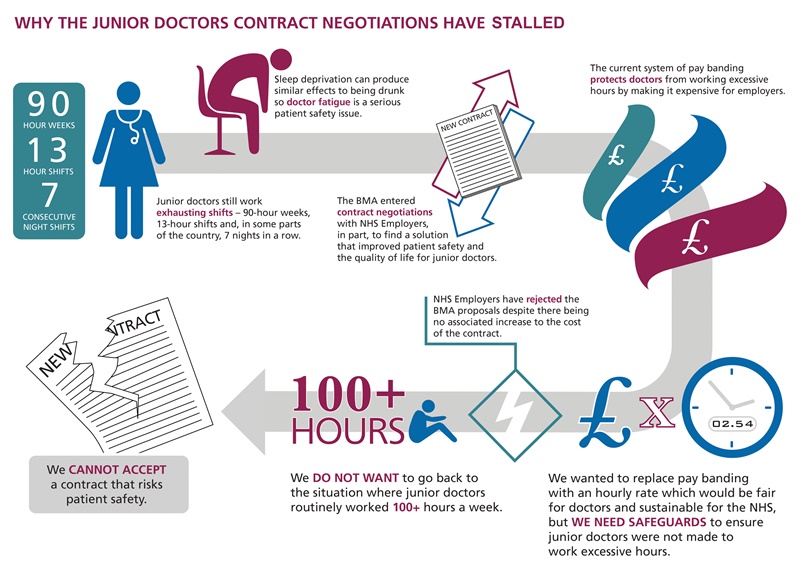17.10.14
BMA walks away from doctors’ contract negotiations
Contract talks for consultants and junior doctors have stalled after the British Medical Association (BMA) walked away from negotiations over “government demands that could have jeopardised patient and doctor welfare”.
The BMA said negotiations had stalled because of inadequate safeguards against excessive working hours and that “the government has been increasingly focused on achieving political priorities”.
The government failed to provide credible evidence on how consultants could safely increase the provision of seven-day services and how it would be funded and was unwilling to introduce proper safeguards to prevent a return to doctors in training working dangerously long hours, according to the BMA.
BMA council chair Mark Porter said: “We always knew the talks would be challenging, given the current financial climate and the government’s political priority to end public sector pay progression.
“Yet the government has been increasingly focused on achieving political priorities at the expense of appropriate safeguards to ensure patient safety and the welfare of doctors.”
He added that the BMA could not agree to changes that have the potential to undermine the safety of patients or the welfare of doctors.

NHS Employers, the organisation negotiating with BMA, expressed its “surprise” and “disappointment” at the medical association’s decision to walk away, which it learned about on Twitter.
Gill Bellord, director of employment relations and reward at NHS Employers, said: “This is a hugely disappointing way to conclude a year and a half of serious discussions. All our talks with the BMA have been aimed at ensuring safer working hours for doctors in training, as well as providing them with stability of pay and agreed work schedules that take account of educational needs. Underpinning all of this is the essential need to deliver safe care for patients.
“Our work with the BMA over the past 18 months had reached the stage of detailed discussion on contract changes that are fully justifiable because they would enable employers to organise clinical services so that patients can access high-quality services every day of the week. Throughout all of these negotiations, we have been offering safeguards to protect the wellbeing of individual doctors, so it is a source of personal and professional disappointment that the BMA team feel able to throw our joint progress so far out of the window, and to walk away from what is currently on the table.”
 Paul Flynn, chair of the BMA consultants committee, said the association continued to support the need for more seven-day services being available, with urgent and emergency medicine being the priority areas for investment.
Paul Flynn, chair of the BMA consultants committee, said the association continued to support the need for more seven-day services being available, with urgent and emergency medicine being the priority areas for investment.
But he said: “Consultants already work across seven days providing emergency care 24/7, with almost nine in 10 working evening and weekends on top of their normal working hours.
“Stretching existing services across seven days also requires more nurses, diagnostic and support staff, as well as community services to be in place at a time when the NHS is facing huge financial pressures.
“Despite this the government has failed to produce any plans on how it will resource this massive expansion, and without this consultants are not prepared to sign up in the dark to a plan that would force them to work dangerously long hours, compromising patient safety or leading to weekday services having to be scaled back as there simply won't be enough doctors to staff them.”
 The co-chair of the BMA junior doctors committee, Kitty Mohan, said that some junior doctors are still working 90-hour weeks, leaving them exhausted and burnt out.
The co-chair of the BMA junior doctors committee, Kitty Mohan, said that some junior doctors are still working 90-hour weeks, leaving them exhausted and burnt out.
“By refusing to ensure that safeguards are in place, the government has failed to protect patients and junior doctors from unsafe and gruelling working patterns.” she said. “Junior doctors are asking that they have the basic guarantees on safe working hours, training, fair pay and respect for the right to a life outside of work, which should be the bare minimum for any employee.
“If the government is serious about increasing the number of people coming into medicine and if we want to stem the flow of young doctors leaving the NHS to work abroad, they need to address these issues urgently.”
NHS Employers said the details to the offer relating to the consultants’ contract, which the BMA has walked away from, are:
- Maintaining a negotiated national framework and the BMA’s role in collective bargaining;
- A maximum 40 hour contract, unless extended by mutual agreement;
- No requirement for the majority of consultants to be contracted for more hours than they are currently contracted for;
- Maintain the current life time earnings potential;
- Accelerated access to higher pay - consultants will be able to access higher levels of pay earlier in their career than is possible under the current pay scales, as long as they meet all necessary access criteria;
- Introduces a fairer way to reward consultants who work frequent and intense shift patterns.
- Continued access to a national clinical excellence award (CEA) scheme, by competitive application;
- Transitional arrangements that provide protection to existing pensionable pay;
- Local clinical excellence awards will be incorporated into the consultants’ contract as part of revised performance payments structure. As this will be a contractual entitlement all consultants will be considered for a pay award against jointly agreed access criteria;
- Jointly agreed safeguards (set out in the contract and supported by jointly agreed guidance), to ensure consultants are provided appropriate protections where service changes are necessary to deliver seven day services;
- A commitment to move towards consultant-led services which will require a growth in the consultant workforce;
- Greater emphasis on clinical engagement when determining service delivery priorities with a duty to consult being placed on employers;
- Strengthens the job planning process and puts it at the heart of the process for determining the appropriate clinical activity to support local service delivery;
- Limits the number of weekends that consultants will need to be available for work, without mutual agreement;
- Maintains an environment where education, training, innovation and research by both NHS and academics can flourish;
- No changes to any of the core contractual entitlements – redundancy, maternity, sick pay, leave entitlements, requests for flexible working etc.
And the current offer on the table for the junior doctors’ contract includes:
- An hours-based model of pay, with pay relating to work done;
- Increased basic pay;
- Pay progression linked to accepting a post at a higher level;
- Pay protection during transition;
- A basic full time working week of 40 hours;
- Maximum hours of 48 per week on average, and a cap of 56 hours per week on average for doctors who opt out of WTR;
- An extension of plain-time working, with a higher rate for unsocial hours - the degree of extension and the rate for unsocial hours had not been decided and was still under discussion;
- An on call availability allowance;
- Working hours safeguards, including:
- A maximum of 72 hours in any seven consecutive days (lower than the limit suggested by the BMA);
- No more than four consecutive night shifts
- No more than five consecutive long day shifts
- A work schedule for each post, mapped to the curriculum and setting out both training opportunities and service commitments. This would be personalised to the job holder and reviewed regularly and also on request;
- System for reporting exceptions (eg work overruns) which would trigger a work schedule review
- System for resolving work schedule issues, including appeals process.
- Business travel expenses in line with Agenda for Change, but also retaining the provisions on relocation and removal expenses for trainees;
- Removal of the current four-month eligibility period for sick pay;
- A joint commitment to press for better information for trainees ahead of their placements. This cannot technically be done via the contract but is a priority for employers as well as trainees;
- Potential to increase pay via work schedule review where there is a regular requirement for additional hours.
A spokesperson for NHS Employers said it expects that as a consequence of the BMA’s actions, the Department of Health is likely to want to consider what steps the government can and should take to move forward, and that local employers are also expected to consider whether they need to make changes to both contracts by other means.
NHS Employers is expected to make a formal report to health ministers in the coming weeks.
Consultant representatives from Wales and Scotland did not take part in the negotiations after deciding a UK-based approach was not in their best interests, the BMA said.
However, the Welsh government recently indicated it wished to join the talks.
(Body Images: Image 1 - Infographic. Image 2 - Paul Flynn. Image 3 - Kitty Mohan. All c. BMA)
Tell us what you think – have your say below or email [email protected]